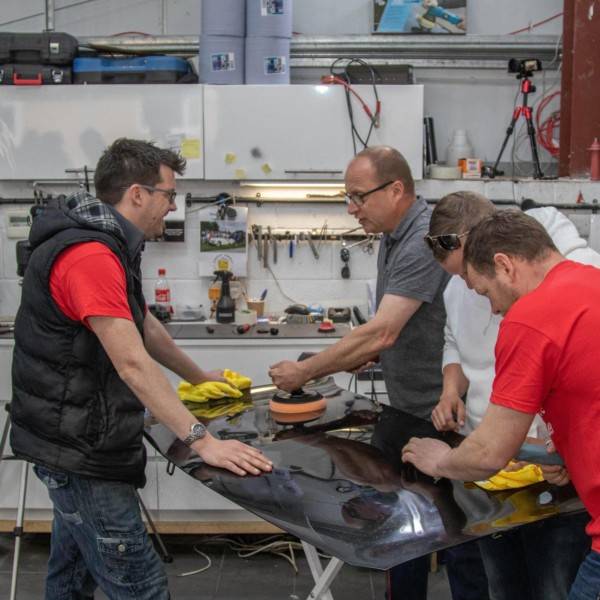“Whilst you’re there” – a slippery slope in business
We constantly see posts from industry professionals showing how they have “gone the extra mile” for their customers. “I wasn’t happy with a single stage, so I did two stages for a better result”…
 It is very admirable to want to do more to uphold your high standards, but the ultimate question is – who is paying for all the extra work? Especially if you’ve been undersold a job through “creative description”…
It is very admirable to want to do more to uphold your high standards, but the ultimate question is – who is paying for all the extra work? Especially if you’ve been undersold a job through “creative description”…
Sometimes, an underquote happens or a process doesn’t work as it is expected to. There are so many circumstances that lead to you feeling the need to do more work; from viewing a vehicle after a “blind” quotation only to find it is far worse than it had been described, to succumbing to your own internal pressures to ensure that the work you are producing is consistently of the highest quality.
The one common factor should always be to ask yourself who should be paying for the additional time and materials you will need to complete the job – you, the detailer – who may not have been able to foresee this, or the customer – who is going to benefit from the result.
In this industry, we seem to be so scared to approach the customer and open discussion about these situations when at the end of the day, it is they who will benefit from the outcome of your work. Let’s break this down into the two examples given above:
The car was worse than described
In this instance, we realise the need to properly qualify our customers first. If you are quoting blind, then the client needs to understand that you can only give an “estimate” and it is down to you as the service provider to educate them about this. You will, no doubt, have seen how many companies will provide a “from” price on their website and Social Media in order that potential customers can see an idea of a typical cost – this is a great way to operate as it takes away some of the guesswork and gives a starting point, but this should not be the price that you always charge – it’s just a basic price in an expected starting condition.
How about putting together a list of questions to ask potential customers in order that you are better forewarned of a vehicle’s position?
- “Have you had any pets in the car?
- “Are there any specific issues you need addressing?”
- “Does your toddler like to leave half-eaten apples down the sides of the seat?”- for example.
Providing you have explained yourself effectively to your customer, then should you arrive to a car described as “not too bad” to discover it is used predominantly as a farm truck with a boot full of straw and a knit-your-own Labrador kit on the passenger seat – you have provided yourself with wriggle room to increase the price you charge commensurate with the additional time and materials needed to achieve a result that meets your high standards.
Don’t feel as though you need to work for free to achieve your company standards, as that is inherently unsustainable.
I wasn’t happy with the result of a single-stage test patch
This type of situation can feel like a nightmare when you come across it, and I wouldn’t like to hazard a guess at the number of detailers who will go on to work late into the night and start again early in the morning to turn a vehicle like this around in time for the prearranged collection in order to achieve a result that they are satisfied with.
But.
Is that good for your business, your family life or your mental health?
In situations like this, your first port of call should always be the customer.
 Call them, speak to them, and explain your findings and how you aren’t happy. If possible, get them to come down so you can show them! We are normally talking about a day or more’s work and several hundred pounds, so get them involved.
Call them, speak to them, and explain your findings and how you aren’t happy. If possible, get them to come down so you can show them! We are normally talking about a day or more’s work and several hundred pounds, so get them involved.
It is down to you to educate the client about how you will improve the car by completing the work you have quoted, but by adding an extra step it will be that much better. Explain how it will take more time and will therefore mean you need to charge more money. Make it their decision! perhaps they don’t think the value of what they may perceive to be a minor improvement is necessary!
Yes, we all make calculation errors and end up having to do a little more work to take account for them, but, from a certain point, nobody should be working for free.
If you were a builder and had been commissioned to build a 4-bedroom house; would you build a 5-bedroom house because “you thought it was better for them”…? Sure, they might appreciate it, but they’re going to expect a 5 bed house for the same price next time too!
Be up-front. Emphasise the “Estimate” on sight-unseen work quotations, and if they insist on a firm price, perhaps quote for a worst-case scenario and say it is an “UP TO” instead, for maximum flexibility.
If you find you’re having issues accurately estimating work, dealing with customers, or selling your services, why not check out our business coaching day options and let us know where you need some help so we can put something together for you.





